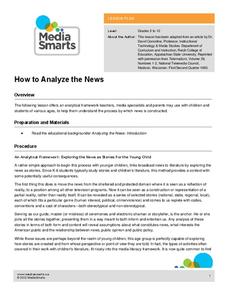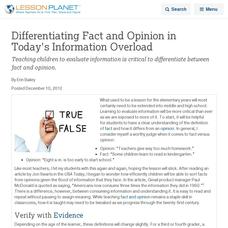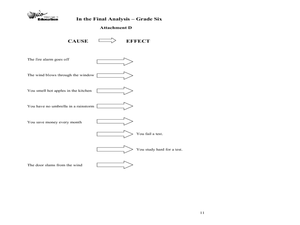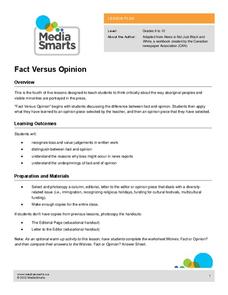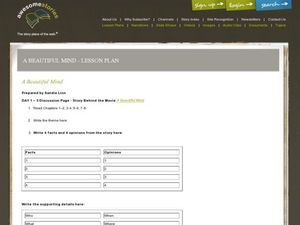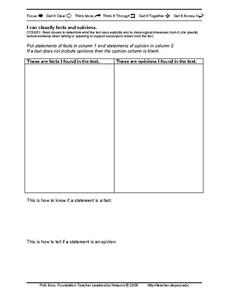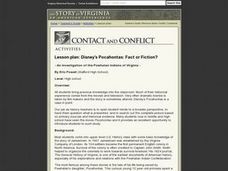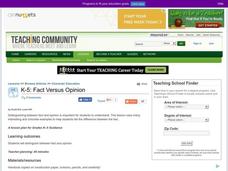Florida Center for Reading Research
Comprehension: Text Analysis, Fact or Opinion Football
Touchdown! Try out this game to help your learners differentiate between fact and opinion. In pairs, pupils switch off reading cards to one another. Learners determine if the sentences on the cards are facts or opinions and continue...
Alcohol Education Trust
Talk About Alcohol: Why Are Young People Advised Not to Drink?
What should young people think about before drinking alcohol? Have your class consider the eight reasons listed here, some of which are facts, and others opinions. Pupils rank each statement from one to eight, where one is the most...
Polk Bros Foundation
Comprehensive Nonfiction Reading Questions
Analyze any nonfiction text with the set of questions on this sheet. Class members practice inferring by noting the main idea and purpose of a passage. They also analyze an opinion in the passage and write a brief summary. See the...
The New York Times
News and News Analysis: Navigating Fact and Opinion in the Times
Help your class understand the difference between fact and opinion by exploring the New York Times homepage and articles. In pairs or small groups, pupils complete a scavenger hunt, answering the provided questions. Next, discuss the...
Curated OER
In Legal Limbo
Newspapers are great learning tools. They act as a conduit for current events, reading comprehension, and critical thinking. Here, pupils read a New York Times article regarding US immigration law under the Obama administration and...
Curated OER
The Value of Facebook
Does Facebook actually have any value? Find out what the New York Times thinks by reading this informational article. Learners use the 10 guiding questions to aid them as the read the provided article regarding the value of Facebook. Two...
Curated OER
Information from Posters
Budding journalists examine and evaluate an informative poster advertising a public meeting to discuss city park issues. They write a paragraph explaining what they found to be effective and ineffective about the poster, then imagine...
Curated OER
Understanding and Using Primary and Secondary Sources in History
Explore primary and secondary sources in this historical analysis lesson. Young researchers define the terms primary source and secondary source. They read a primary source document provided by the teacher and answer questions about the...
Curated OER
Fact vs. Opinion (Part II)
How can you tell the difference between fact and opinion? Using newspapers, learners determine which articles contain statements of fact, and which articles reflect the writer's opinion. The lesson plan includes a discussion format and a...
Media Smarts
How to Analyze the News
Teach kids how to watch television, specifically the news, with this creative idea for learners of all ages from the Media Awareness Network. The elementary school plan focuses on presenting news as a story and uses Jon Scieszka's story...
Curated OER
Juggling Fact and Opinion in Today's Information Overload
Teaching children to evaluate information is critical to differentiate between fact and opinion.
Curated OER
A Way with Words
How do facts and opinions impact the news? After reading "How to Cover a War" from the New York Times, middle schoolers evaluate the claims in the article. They also consider the media's responsibilities in reporting during wartime....
Curated OER
The Final Analysis: Cause and Effect, Fact and Opinion
Middle schoolers read and review informational texts, analyze cause and effect, and distinguish fact from opinion. They assess a "one-minute mystery" you read aloud for cause and effect relationships. Resource includes complete set of...
Media Smarts
Fact versus Opinion
Part of a series aimed at breaking down cultural bias from the Canadian Media Awareness Network, this activity identifies where opinions do and don't belong in a newspaper. Pupils review handouts about the purpose of editorial comments...
Curated OER
A Beautiful Mind: Main ideas and supporting details
This activity that accompanies a reading of A Beautiful Mind includes over 20 questions that address theme, fact and opinion, supporting details, characterization, and quote comprehension.
Curated OER
"The Clever Monkey"
Second graders complete a variety of activities related to the book "The Clever Monkey" by Rob Cleveland. They answer story comprehension questions, and rewrite the story. Students also complete a comprehension and fact or opinion...
Curated OER
Fact or Opinion?
Challenge your class to determine between facts or opinions in the following PowerPoint. Each section contains an advertisement with stated facts and opinions. This is a great game for learners to play individually or with partners.
Curated OER
Is It Fact or Opinion?
Distinguish between fact and opinions in this nonfiction reading lesson. Middle schoolers read 'The Diary of an Early American Boy' and work in groups to analyze the text. They record the facts and opinions for the text.
Curated OER
Fact and Opinion
Facts and opinions are clearly defined in this organized PowerPoint. Following the definitions are a few examples that students must identify as facts or opinions. Tip: After viewing this presentation, ask students to share some of their...
Polk Bros Foundation
I Can Classify Facts and Opinions
Telling fact from opinion can be tricky. Direct your class to practice their reading and comprehension skills by taking notes on the facts and opinions in a text. Pupils fill out a two-column chart and write down how they know a...
Teacher Printables
Just the Facts
Show your class how fascinating a text can be by asking them to focus on interesting facts they learned while reading. There are boxes for six facts as well as one large box where pupils can record the most important fact from their...
Curated OER
Creature Feature Poetry Keyword Search!
Young scholars examine the differences between fact and opinion, and brainstorm ideas for a keyword list by analyzing facts. They listen to poems, and create posters listing three keywords about each creature featured in the poetry.
Curated OER
Disney's Pocahontas: Fact or Fiction?
Did you know that Pocahontas was 12 when Jamestown was established? Did you know that she later married John Rolfe? Did you know that she lived in London for two years? Did you know that she died of small pox? Class members study the...
Curated OER
Fact Versus Opinion
Learners differentiate between fact and opinion. They define fact and opinion, then listen to and identify examples of each. Students identify different books where facts and opinions can be found, and cut out newspaper and magazine...











